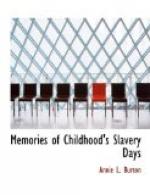I remember, at the beginning of the war, two colored men were hung in Clayton; one, Caesar King, for killing a blood hound and biting off an overseer’s ear; the other, Dabney Madison, for the murder of his master. Dabney Madison’s master was really shot by a man named Houston, who was infatuated with Madison’s mistress, and who had hired Madison to make the bullets for him. Houston escaped after the deed, and the blame fell on Dabney Madison, as he was the only slave of his master and mistress. The clothes of the two victims were hung on two pine trees, and no colored person would touch them. Since I have grown up, I have seen the skeleton of one of these men in the office of a doctor in Clayton.
After the men were hung, the bones were put in an old deserted house. Somebody that cared for the bones used to put them in the sun in bright weather, and back in the house when it rained. Finally the bones disappeared, although the boxes that had contained them still remained.
At one time, when they were building barns on the plantation, one of the big boys got a little brandy and gave us children all a drink, enough to make us drunk. Four doctors were sent for, but nobody could tell what was the matter with us, except they thought we had eaten something poisonous. They wanted to give us some castor oil, but we refused to take it, because we thought that the oil was made from the bones of the dead men we had seen. Finally, we told about the big white boy giving us the brandy, and the mystery was cleared up.
Young as I was then, I remember this conversation between master and mistress, on master’s return from the gate one day, when he had received the latest news: “William, what is the news from the seat of war?” “A great battle was fought at Bull Run, and the Confederates won,” he replied. “Oh, good, good,” said mistress, “and what did Jeff Davis say?” “Look out for the blockade. I do not know what the end may be soon,” he answered. “What does Jeff Davis mean by that?” she asked. “Sarah Anne, I don’t know, unless he means that the niggers will be free.” “O, my God, what shall we do?” “I presume,” he said, “we shall have to put our boys to work and hire help.” “But,” she said, “what will the niggers do if they are free? Why, they will starve if we don’t keep them.” “Oh, well,” he said, “let them wander, if they will not stay with their owners. I don’t doubt that many owners have been good to their slaves, and they would rather remain with their owners than wander about without home or country.”
My mistress often told me that my father was a planter who owned a plantation about two miles from ours. He was a white man, born in Liverpool, England. He died in Lewisville, Alabama, in the year 1875.




